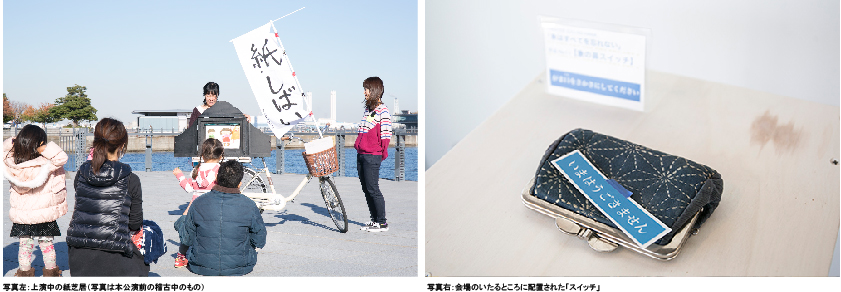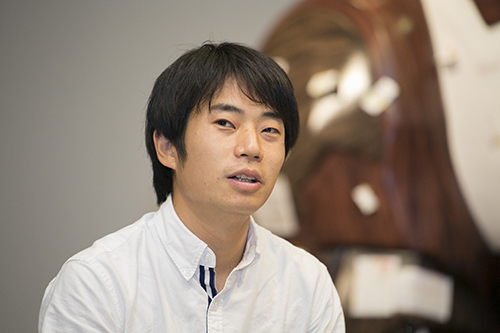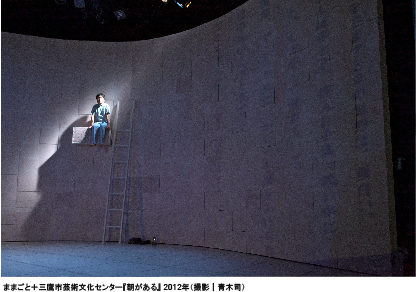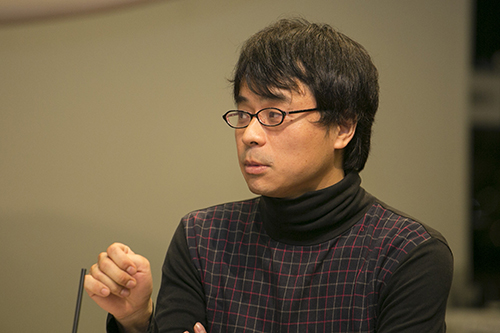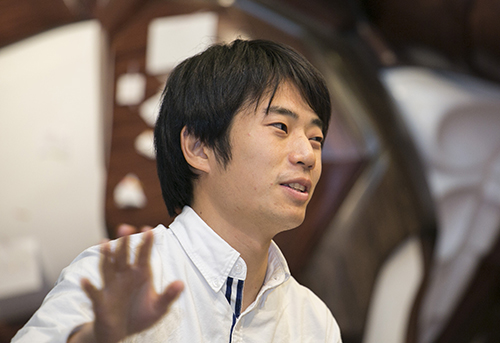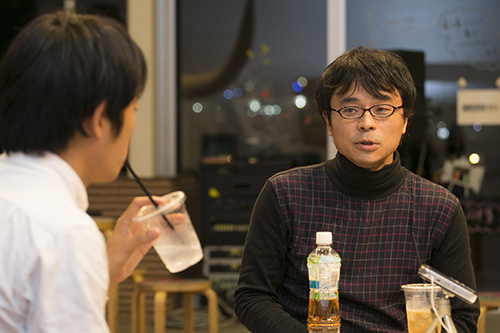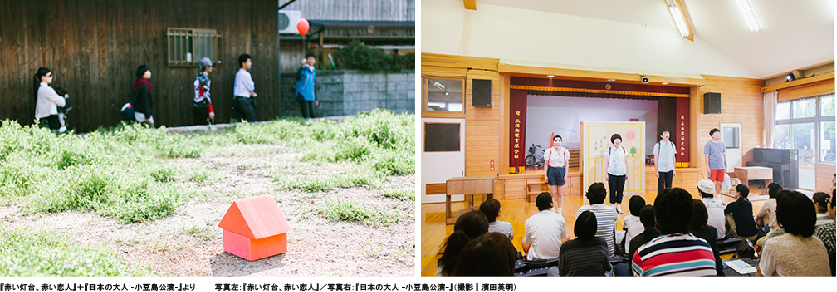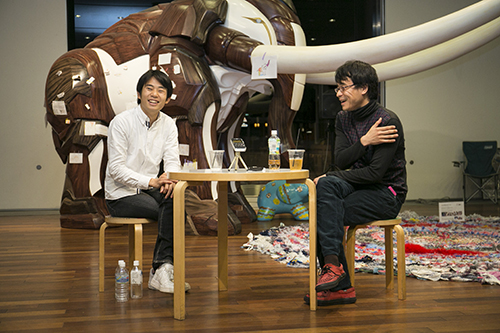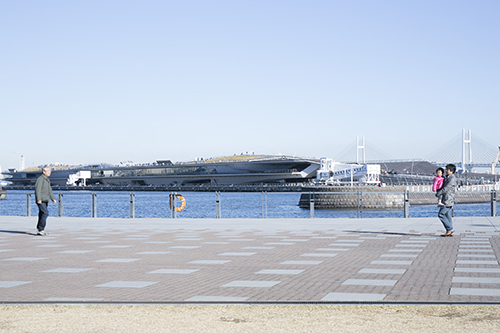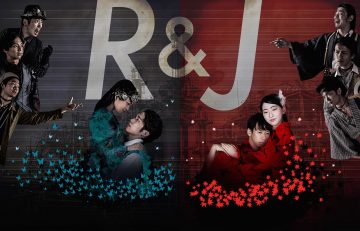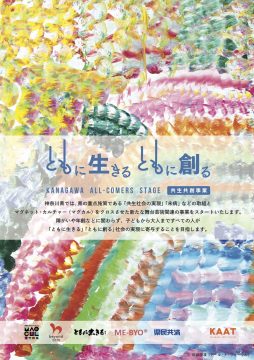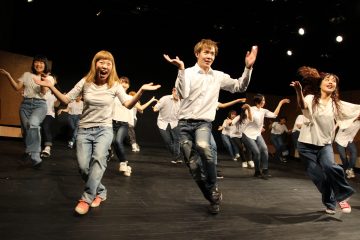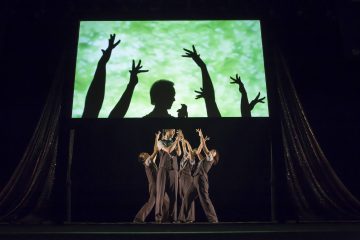Passing by theater: the past, present, and future of playing house
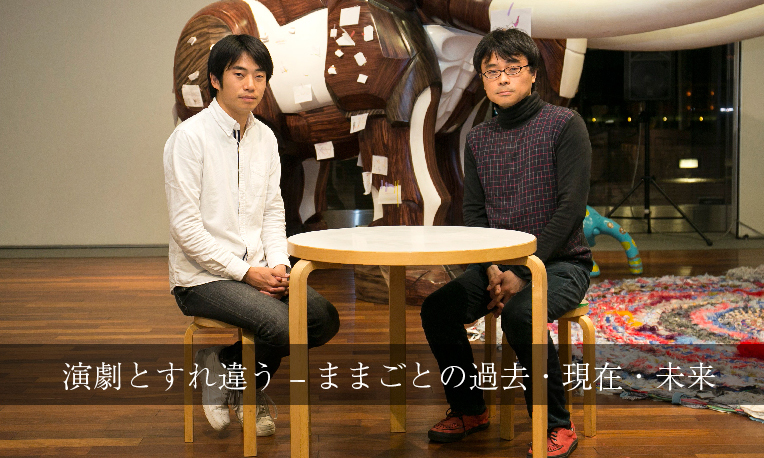
Yukio Shiba, head of the theater company Magoto, is presenting "The Elephant Will Not Forget Everything" (Thursday, Friday, Saturday, and Sunday, December 1st to December 15th, 2013) on the stage of Zou-no-hana Terrace in Yokohama facing the sea. . His style, which focuses on the beauty of a mystery novel-like structure, culminated in ``My Star'' (2010), which boldly incorporates hip-hop, and won the 54th Kishida Drama Award. It dynamically updated the style of contemporary theater. Although he can truly be called a standard-bearer for a new generation, in recent years he seems to have intentionally kept a certain distance from Tokyo's theater scene.
What is Yukio Shiba looking at and what is he trying to do now? An interview to hear about the past, present, and future.
Interview&Text by Chikara Fujiwara
Photo by Masanobu Nishino
Cooperation: Zou-no-hana Terrace
□Profile
Chikara Fujiwara
http://bricolaq.com/page/BricolaQ.html
Born in 1977. Editor, freelancer. Head of personal media BricolaQ. Born in Kochi City, moved to Tokyo alone at the age of 12 and started living alone in Tokyo. After that, he moved around a lot, and after working for a publishing company, became a freelancer. Responsible for editing magazines such as ``Expo'', Musashino Art University public relations magazine ``mauleaf'', and Setagaya Public Theater ``Caromag''. He also writes theater reviews under the name Pluthermal Fujiko. Judge of "CoRich Performing Arts Festival!" in 2012 and 2013. Co-edited with Riki Tsujimoto, ``Book Guide as Architecture'' (Meigetsudo Shoten). Co-authored with Kyoko Tokunaga, ``The Strongest Theory of Theater'' (Asuka Shinsha). Currently living in Yokohama.
Yukio Shiba
http://www.mamagoto.org/
Born in 1982, from Aichi Prefecture. Belongs to the production department of Seinendan. Resident artist at "Steep Hill Studio".
While a student at Nihon University College of Art, he won the 2nd Sendai Drama Award for ``Dodomino.'' In 2010, he won the 54th Kishida Drama Award for ``My Star.''
It is characterized by plays that carefully capture the subtleties of everyday life, and production that incorporates ideas outside of theater, such as loops and sampling. He depicts the universal world from a new perspective, including the play ``Ayumi,'' which continues throughout the story, the rap musical ``My Star,'' and ``Repetition and Continuation,'' a one-man play looped into a large family.
He is active all over the country, participating in the Aichi Triennale and the Setouchi Triennale, directing civic plays in Kani City, Gifu Prefecture, and directing at Iwaki Sogo High School in Fukushima Prefecture.
Between “being” and “doing”
Fujiwara : Today, I would like to ask Yukio Shiba about the past, present, and future of the theater company Magoto. Let's start by talking about the ``current'' Zou-no-hana Terrace. Mamagoto created and presented experimental works with various actors several times here this spring, and in September they created a flash mob-like work with members gathered through auditions. This time , ``The Elephant Doesn't Forget Everything'' will probably be a performance (?) that is born out of that accumulation, but after watching the process so far, I thought it was very attractive, or rather, it had a very good atmosphere. It was. How do you feel about what you're doing?
Shiba : In the spring, I thought, ``I'm being absent-minded.'' (laughs) I was thinking about making the beginning and end vague to make it as annoying as possible.
Fujiwara : In the spring, the start time was also about the same. I was like, "Okay, let's get started now" (laughs). It's like there's no frame.
Shiba : This year, I stayed in Shodoshima for a long time (as an artist invited to the Setouchi Triennale ), and while there I was thinking about the relationship between ``doing/being done'' and ``being/seeing.'' Yo. Theater is born at the moment of ``doing'' it, and the viewer is in a passive state of being ``done'' by it. But at Zou-no-hana Terrace, there are usually a lot of people passing by, so I guess they'll do it to people they don't want to do it to.
Fujiwara : You get involved.
Shiba : That is an element that is inseparable from theater. But when it comes to art works and videos, like Perry the Elephant here (a gigantic object created by Noboru Tsubaki ), they express the very existence of ``existence.'' If you are interested in something that is there, you can watch it, and if you don't want to see it, you don't have to worry about it. Gradually, I began to think that it would be possible to create something mysterious, somewhere between "being" and "doing."
Fujiwara : I guess it's somewhere between an installation and a performance.
Shiba : At that time, we definitely tried to keep to the line of whether or not we would normally feel uncomfortable. It's important not only for me but also for the feelings of the members who are participating, so I practice asking the members, "What do you think?", asking them to respond, and then asking back, hitting back, and so on. I'm doing. That's why we didn't use a top-down format this time.
Fujiwara : This time, we have assembled various teams and have each group produce the work.
Shiba : That's right. For example, there is a device called a switch that activates a short performance, and there is also music, singing, radio, film shooting, picture-story shows, and even works like flash mobs. Then there's a mysterious team called design, who create things that people who happen to come by can leave behind something. There are also tours. There's already a lot (lol).
Fujiwara : You probably won't be able to control it (lol).
Shiba : My job is probably how to arrange and compose them. The scripts for radio dramas, commercials, and news stories are all written by the actors themselves. Oh, there's a commercial for Zou-no-hana Cafe's soft serve ice cream (lol).
Passing by theater
Fujiwara : The soft serve ice cream here is delicious. ...Well, in normal theaters, there is a shared etiquette such as turning off your cell phone and sitting in your seat, but here there is no such agreement. Lots of kids will come on Saturdays and Sundays, and I'm sure they'll be hitting that switch a lot (lol).
Shiba : Even on Shodoshima, it is impossible to envision a ``process'' in a place or time with unspecified elements and expect everything to be done well, so we must clear the ``results'' of each work, moment by moment. I said I wanted it. For example, this time as well, I felt that the judge of what to do when a child keeps pushing the switch was something that would not be possible unless each member had a sense of artistry in their work and in their own bodies. Otherwise, you won't be able to do anything if something happens that you didn't instruct.
Fujiwara : Come to think of it, on the first day the current members met, we said, ``I want each of us to realize that each of us is a piece of work and an artist.'' That seems quite surprising given the nature of the writer Yukio Shiba used to be. After all, Shiba-kun was a very perfectionist and controlling type, wasn't he? I wonder when my mindset changed.
Shiba : Since the beginning of this year, I've wanted to work as a playwright to bring plays to life on paper. Up until then, I had been using my brain as a director to control all aspects of time and space and say, ``This is my play.'' But at Zou-no-hana Terrace, it's impossible to control the whole thing, and I didn't think it would be interesting to present the work in the same way as in a theater.
Fujiwara : Is that where the concept of ``passing with theater'' came about?
Shiba : If you try to use your usual theater brain to show the audience from head to buttocks as a piece of work, it's the same as locking it up inside a wall, so the chances of chance are greatly reduced. This time, I want to break away from the relationship of ``doing it/being done to it'' and make it ``passing each other''. People who happened to come by suddenly stop and say they can leave or just watch for a while. That's why I wanted to do something that would make sense even if you just saw it for a moment.
A shift in the way we think about “plays”
Fujiwara : On the other hand, I think that my mindset as a playwright is also changing.
Shiba : That's right. What I've been conscious of lately is not to deviate too much from human time...
Fujiwara : Human time?
Shiba : For example, if it is one hour, it means that the time in the play and the time outside are the same. Up until now, with ``Ayumi'' and ``My Star,'' we have often used a way of sharing and empathizing by expanding and contracting time and encompassing it all at once, but when we do that, humans become symbolic. I think that method suits my qualifications. However, I realized that the play also had the effect of touching the hearts of people of a wide range of generations and regions through personal experiences and emotions.
Fujiwara : In an interview for``Geki Saisairon'' (Asuka Shinsha) , you said that you wanted to aim for universality from a unique story. I read such a story in the ``Mamagoto no Shimbun'' which can be read on the website. I wonder if this trend has started to emerge since ``Asa Aru'' (2012).
Shiba : At that time, I was wondering if it was possible to write about human things without relying on the universality of my previous methods. I saw plays such as ``My Star'' and ``Ayumi'' performed by high school students, and the other day I saw ``My Star'' being performed by another person in New York... .
Fujiwara : So you saw someone else directing your own play.
Shiba : ...I now think that a playwright is someone who can embed a play into paper. But I realized that what I had written up until now was nothing more than a ``script,'' and it only became a play when the director embedded dramatic elements into it. I started to think that writing such plays was not a playwright's job. When someone decides to perform this play, even if they just read it in a book, it creates a sense of drama, a strange atmosphere, and a kind of theatrical twist that is different from real-life interactions. It should be called.
Fujiwara : But ``My Star'' won the Kishida Drama Award and was highly praised as a ``play'', right?
Shiba : It's strange to say this myself, but I can't understand it. I don't think it would be a good idea to perform that play as it is.
Fujiwara : This seems to have already been discussed in the ``past,'' but around 2010, when ``My Star'' premiered, Yukio Shiba's characteristic focus on ``structure'' became extremely acute. It's that time of year, isn't it? In other words, he created works that moved people by clearly presenting certain structures and rules. There must have been a possibility of increasing the level of perfection of the play in that direction, and ultimately creating the play as something like a blueprint. But does that mean you changed gears without going there?
Shiba : Maybe I just ran out of ideas (lol). Well, I thought that digging that hard wouldn't do anything. Until then, I had written about "time" and "space" first, leaving "human beings" on the back burner. As a crystallization of structure, the movement of circles, triangles, and squares was ultimately supposed to evoke emotion (lol), but in the end, I came to believe that each individual person is important. I wouldn't go so far as to call it the heart. That's why I'm thinking of setting some restrictions when writing. I guess the roles aren't swapped. I don't keep track of time...I don't really protect myself (lol).
Fujiwara : In Shodoshima's ``Red Lighthouse, Red First Love,'' which I saw the other day, it tells a very specific human story about a man who once stayed on the island and his ex-lover who left the island. It made me feel the universal human condition, and I was so moved by it that I cried in front of the sea, and the mayor of Shodoshima, who saw it, was also very happy and wrote his thoughts on his blog . However, that doesn't mean that the story didn't seem like he was trying to please the people of the island to please them; instead, he was simply competing with words and stories, and I felt strongly about Yukio Shiba's power as a playwright.
Connecting stories
Fujiwara : I feel like this change in awareness of plays isn't just limited to Shiba-kun personally. Recently, there has been a movement in the same period to reconsider the concept of "story." As a symbolic
The theme of F/T (Festival/Tokyo) 13 is "Traveling through stories." Do you have that kind of contemporary feeling?
Shiba : Absolutely. Personally, I've been feeling a sense of crisis since around 2010 that the method of pursuing the structure is no longer working, so I felt like I needed to make a shift while continuing to re-perform existing works. Then, perhaps after the earthquake, I personally started thinking, ``I want to see stories.'' Previously, I thought the linear flow of time was boring and old-fashioned, so I wanted to see a more interesting time structure. But now I have to doubt that, and I'm worried about whether what I've done now will bear fruit next year, so rather than dealing with the vast time of my life like (Thornton) Wilder, I'm thinking about tomorrow, next year, 10 I started wanting stories that took place about a year later. We need a story that connects us.
Fujiwara : A story about connections?
Shiba : In ``My Star'' and ``Ayumi,'' time moves back and forth in blocks. The same goes for ``repetition and continuity.'' But for example, in fairy tales and fairy tales, time doesn't go back, right? There's no flashback scene of the demon you went to defeat (lol), and there's no jump to 100 years in the future.
Fujiwara : In that sense, Urashima Taro is a bit innovative.
Shiba : It's innovative, but it doesn't deviate from Urashima's perspective, and it basically moves forward. Now, I want to know whether that kind of "I" perspective will really connect 10 years from now. It's strange even to me.
Theater music video
Fujiwara : I certainly feel that we share the same contemporary anxieties. But I feel like it's not just the effects of the earthquake.
Shiba : Ah, then let's talk about the music video.
Fujiwara : Music video?
Shiba : No, it's a detailed story, so I guess I'll stop talking about it...
Fujiwara : Well, it looks interesting, so I'd like to hear it.
Shiba : Well, that's partly because I became acutely aware of it after watching Maam and Gypsy 's work, but it's like a music video.When time flows in a dramatic way, people get excited. I'm impressed. Music depicts the passage of time through sound. Among my works, the ones that were overwhelmingly popular were ``My Star'' and ``Repetition and Continuity.'' The key point in both of those works is that the actors are not able to create time on stage. So, we have to time it so that we can run parallel at the same time. In other words, the movement of musical time has already been determined. I'm thinking now that it was a ``dance adaptation of theater,'' but the acting was decided as choreography. In a normal play, the play would not flow unless the actors made time for it. In order to control that, for example, Oriza (Hirata) did things like adding effects in seconds...
Fujiwara : The director specified that there should be a pause of 3 seconds.
Shiba : ...In my case, I let the music run parallel to each other. Music moves time forward, so you can count the beats of the rhythm. Of course, borrowing the dramatic nature of music just for a moment is the worst thing to do.
Fujiwara : It's like playing melodramatic music in scenes where you want to make people cry.
Shiba : It's obvious that the intention is too transparent, so there is a negative reaction. So I decided to fix the music and create a development that goes with it and perform. The other day I was wondering if that was a ``music video-like idea''. I think it's a pleasant feeling after all. It may be said that it is a combination of musical excitement and theatrical performance. However, at that time, I thought that actors would no longer be able to create time on their own.
Fujiwara : When the musical structure is decided in advance, like in a music video, the acting of the actors and the words of the script have a large part to serve the musical structure, and can go ``outside'' it. That means it's impossible.
Shiba : Even as a director, I can no longer bear to deviate from the music. But I felt like that ignored the role of actors in creating drama.
Fujiwara : Does that mean that what you expect from actors is changing?
Shiba : I think it has changed. I think it's becoming more serious, and you might even say it's getting tougher. I started checking to see if my time was passing while acting. Before, there was music, so if it was 3 minutes, it had to be 3 minutes long, but now it doesn't matter if it's 2 minutes 50 seconds or 3 minutes 10 seconds, as long as it creates drama. Gradually, the music video style didn't suit me, and I started wanting to see something that continued to develop forward. But music that keeps unfolding doesn't feel as pleasurable. I think it's easier to feel more comfortable with music that is synchronized over and over again.
Fujiwara : Ultimately, it's the bolero , but there's something about minimalist repetition that feels good.
Shiba : Today's pop music is based on repetition, isn't it? I don't think it's pop for a song to start with the first melody, continue to develop, and end without ever repeating itself. But right now, I want to create theater and plays that don't rely on the repetitive structure of pop music.
Fujiwara : I wonder if it's getting closer to a novel. Novels also generally don't have repetition, and they tend to connect more and more to form a story.
Shiba : I think we are getting closer to the basic form of a play.
Shiba : I'm not sure if it's suitable for me, though. But I have a feeling that something interesting will come out of something that continues to unfold.
create a home
Fujiwara : By the way, the fact that you haven't been in Tokyo much lately is of course intentional, right?
Shiba : I had been asked to do some things, but I didn't have a plan that I wanted to bring to Tokyo as a solo performance for the theater company. At the same time, I don't feel like there's much point in doing it in Tokyo anymore. There are so many theater companies out there that I can't get enough of them, and if I could create the most interesting play, I would have done it, but it seems like I don't have that kind of talent.
Fujiwara : No, that would be humility.
Shiba : No, it's true. There doesn't seem to be any chance of winning. I don't want to do anything I'm not suited for (lol).
Fujiwara : Are you saying you only fight to win? (Laughs) Well, no one can win everything, so it's exhausting. As long as I'm in Tokyo, I'll have no choice but to compete.
Shiba : It's nice to release a new work and have people in Tokyo say it's interesting, but right now I'm happy to have it seen by people who have never seen a play before. . Moreover, I have been saying for several years that it would be more interesting to sit down in an unknown place rather than touring around the region based in Tokyo, and this year I finally decided to spend a long time on Shodoshima and Zou-no-hana Terrace. I was allowed to do it. Now, rather than creating something in a theater for a short period of time, I'm more interested in staying somewhere and letting the town know about us.
Fujiwara : It means we have time to get to know each other.
Shiba : It was very difficult to gain the feeling of being recognized by the 250 households on Shodoshima, and it was both joyful and difficult. But it was really fun.
Fujiwara : When I went there in the fall, it felt like it had already blended into the island quite a bit.
Shiba : I don't think it would have been possible with just one season. Because we did it in the spring, summer, and fall, it became easier and easier to be there and perform. I think both ourselves and the town have changed. In the spring, we were still very close to each other, and we were still guests or rather outsiders to the island. But if you feel like an outsider, you won't be able to think far away. By autumn, I was naturally in a mode of entertaining people.
Fujiwara : Come to think of it, Shodoshima and Zou-no-hana Terrace are both connected by the sea. It's a port town.
Shiba : There's a feeling of welcome at the port. In Shodoshima, we stayed at the pier all the time, so everyone who came by boat looked like a customer, so it was very natural for us to stand on the pier and perform. Even if it means seeing off someone who is leaving. That's why with ``Elephants Don't Forget Everything,'' we want people to feel at home and feel a little better when they come to visit.
Fujiwara : As you practice more and more, don't you think you're gradually starting to feel a sense of home?
Shiba : The reason we put up various things and draw pictures is because we want to expand our territory and feel welcome to people who happen to come to the cafe. At first, the members were reluctant to put a piece of paper on the wall. I'm not saying you should be brazen, but I think it's important to get used to the situation. I want to turn this into a theater. But rather than locking people in and turning it into a theater, I want to turn it into a theater momentarily with the behavior and gestures of the people here. Then it disappears and we return to our daily lives...
Fujiwara : Ah, it means "disappear."
Shiba : When I saw other art works on Shodoshima, I was disappointed because people didn't have to be there. When it comes to theater, there's a certain reluctance to have people watching, and the relationship between ``doing it and not doing it'' tends to create a sense of pressure. But on the other hand, there were times when I thought it was good about theater, that it could disappear. Works can appear and disappear like illusions. That switch was one of the experiments that I tried to do to see how good the performance was. I don't know if it will work though.
playing house in the future
Fujiwara : Lastly, is there anything you would like to talk about about the future?
Shiba : I see... The autumn session in Shodoshima really feels like a dream. Just dancing, singing, and walking around with people (lol), we got a little bit of money, and we became a part of the gang, like the town's playboys, who got excited when you called them.
Fujiwara : The play house has finally turned into a chindon shop... (lol).
Shiba : At the end of the show on Shodoshima, we had a one-hour package with Nina Hatada 's picture-story show, Yuri Nago 's dance, and musical instrument performances. My dream would be to continue performing like that on a daily basis while staying in a town somewhere and creating one new piece a year. Once something is created in one place, once you go there, it can be put into operation at any time with just a few minor adjustments. So I'm updating myself by creating three new theatrical releases a year...I guess I don't have to do that for now.
Fujiwara : Since Itsuki-kun (Nina Hatada's son) is also a member, it feels like a traveling entertainer with a child on the move.
Shiba : The fact that there are children working in the theater company is also a big factor. It's not reproducible and it's too hard to control, so I don't think I would have liked it if it had been the same way in the past. But now I'm really grateful for his presence. Just by being together, your theatrical perspective expands. Even on Shodoshima, he was popular just by being there, and just being there was a great job. Most likely, I was working. That's why I decided to bring him along in the first stage of the production (lol).
Fujiwara : Ah, that's true, I really felt like something was happening just by having Itsuki-kun there. It's the same when I'm in Elephant's Trunk, and when I look at it, I feel like something is lifted.
Shiba : On the other hand, I also want to create something new in Tokyo through my plays. I can't see it at all yet, but I'm currently in the training period. I feel like the time will come again when we will reconsider our plays and return to words. And I think it would be better to be at the forefront of that (lol).
Fujiwara : Shiba-kun has such a keen sense of smell.
Shiba : It's just a hunch...and whether or not I have the aptitude for it is another matter...(lol)
Magcal editorial department postscript]
As is customary after every interview, we once again asked Mr. Shiba for his "recommended 〇〇".
Mr. Shiba's favorite is the sea view that stretches out in front of Zou-no-hana Terrace. He especially likes the view from the lawn on the terrace.
The Magcal editorial department also went there on a holiday, and the view of the sea from the terrace was very pleasant.
Watching people passing by, parents and children walking, pets walking, etc., was like watching a stage play, and I couldn't help but lose track of time and take a break.
It may be a bit cold this season, but it might be nice to relax and enjoy the view while enjoying the ice cream that was mentioned during our conversation.
